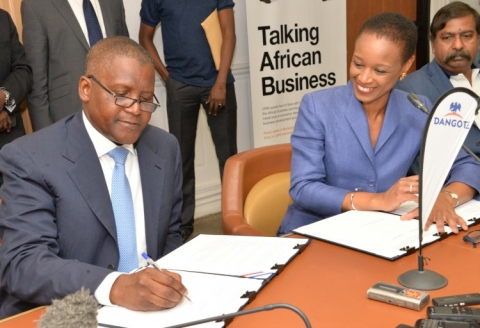Jan272016
Posted at 9:45 AM
Guest blog post by Enoh Titilayo Ebong, Deputy Director and Chief Operating Officer of the U.S. Trade and Development Agency
When I was growing up in Lagos, Nigeria’s largest city, my father used to say that his future was in his past. In other words, you can never know how what happens today might impact tomorrow.
My father, Ime James Ebong, used to regale my sisters and me with stories about rising through the ranks of the Nigerian Civil Service after the country gained independence in 1960. As the Permanent Secretary for the Ministry of Economic Development and Reconstruction, he worked to coordinate foreign investment that could help build infrastructure and promote growth. He believed strongly in a global Nigeria, and traveled to the United States many times to establish partnerships with American companies.
Now it’s my turn. This week, I joined U.S. Secretary of Commerce Penny Pritzker and the members of the President’s Advisory Council on Doing Business in Africa on a fact-finding mission to Nigeria and Rwanda. The mission was designed to do what my father did: to share information and to identify opportunities to enhance the U.S.-Africa commercial partnership.
I was asked to join the trip in my role as Deputy Director of the U.S. Trade and Development Agency, which collaborates with U.S. companies to craft solutions to development challenges in Nigeria, Rwanda and around the world. Fact-finding is an important element of what we do. During the critical early stages of an infrastructure project’s development, we build partnerships between African stakeholders and U.S. firms that identify the components necessary to make the project bankable.
When I first came to USTDA, the Nigerian government had recently begun to open up its telecommunications sector. Since then, we have been connecting Nigerian telecom companies with U.S. experts who can help them modernize their infrastructure. We are currently helping Nigeria’s Main One Cable Company plan for the extension of a 300-mile undersea fiber optic network from Lagos to Port Harcourt. Through their work with a U.S. company, HIP Consult, Inc. (Washington, DC), Main One will increase the number of people and businesses with access to telecom services throughout the region.
Because this model has proven so successful, we are adopting it to help our Nigerian partners privatize their electricity sector. In fact, we’re working across the value chain to bring energy to more Nigerians. As just one example, USTDA is evaluating the technical and financial viability of constructing a 275 megawatt gas-fired power plant for Royal Power Integrated and General Services Limited. The project would increase capacity and improve access to power for residential and commercial customers across Lagos State.
This effort is a great example of how the U.S. and Africa are working together to increase electricity access under President Obama’s Power Africa initiative. By collaborating on projects like this one, we are helping to ensure that more Nigerians have access to energy. And we are helping to strengthen economic ties between Nigeria and the U.S.
As both a daughter of Nigeria and a proud American citizen, I am starting to see how my father’s past shaped my future. His commitment to Nigeria’s growth inspired me to join the U.S. government’s efforts to promote development by leveraging the expertise and resources of the U.S. private sector. I am so grateful for this opportunity to return to the country of my birth and join U.S. and African stakeholders in exchanging ideas to bolster our partnership. I know my father would agree that, by strengthening trade and development ties today, we are helping to ensure a safer, more prosperous tomorrow.



